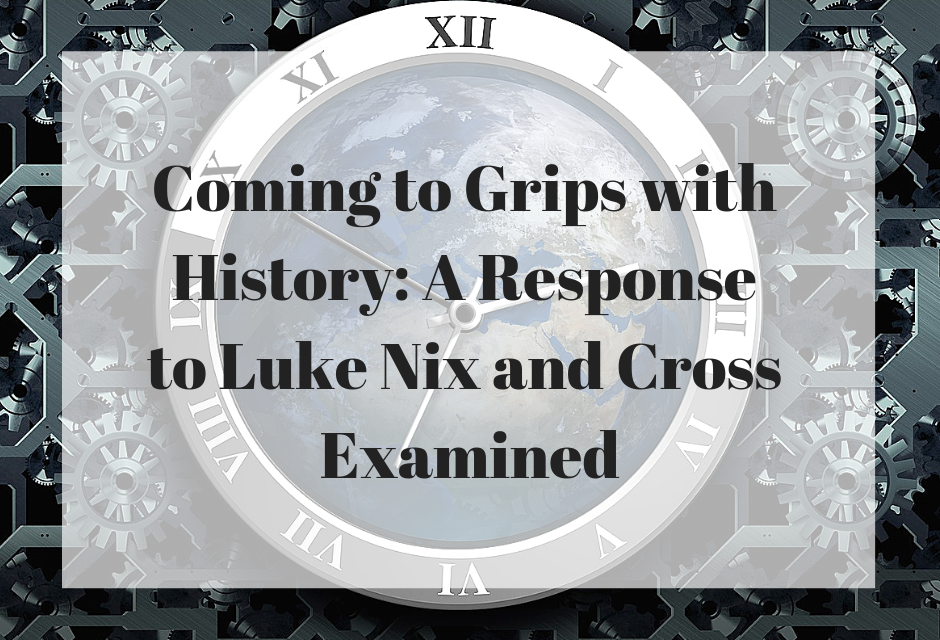[Originally published in full as Coming to Grips with History: A Response to Luke Nix and Cross Examined]
A talented blogger, Luke Nix of Faithful Thinkers is an up-and-coming apologist whose work has, from time to time, caught the attention of those responsible for sharing content on the popular Cross Examined blog.
Recently, he has taken to task (as others have in the past) the relatively recent “Is Genesis History?” documentary in a blog post, which Cross Examined has decided to syndicate across its various platforms.
Unfortunately, upon reading the article, I was disappointed to find it rife with logical fallacies (which is ironic for reasons that will become clear momentarily), complete misunderstandings of what young age creationists (YAC) teach, and dubious claims about the history and philosophy of science.
I do not very often engage in in-house debates with fellow believers; when I do, it is because there is an opportunity to correct widespread misunderstandings and respond to them in a gracious, admonishing way.
This response to Nix is therefore not an effort to quarrel, but in the opposite spirit, take some of the most common criticisms of YAC and show, respectfully, where, how, and why they fail.
I appreciate Luke’s commitment to an edifying, spiritually-sound dialogue. He writes:
There is much unnecessary confusion and heat in the Church concerning the debate over origins, so I am hoping to provide a charitable critique in the context of Christian unity and love.
I want to say up front that I appreciate this and pray my critique comes across in the same spirit.
I should also say that Luke and I share similar professional backgrounds, and thus I hope we are able to connect on that more personal level as well.
In recent days, I have been pleased to participate in many fruitful dialogues with individuals who affirm various views on creation. Ironically, I think one of the biggest disconnects between those who affirm any form of old earth creationism (OEC) versus those who affirm young earth creationism (YEC) is, as Luke stated, “unnecessary confusion.”
However, it’s likely our individual understanding of such phenomena is vastly and altogether different. Thus, before diving into my critique, I wish to offer a “takeaway” for my OEC brethren who read this post:
Please make a concerted effort to understand what young age creationists actually teach before critiquing their views.
With that admonition in mind, let’s begin with some introductory observations I noted after reading the entire article.
Introductory Remarks and Observations
First, I should admit my bias.
Is Genesis History? (IGH) is one of my favorite creationist enterprises, for at least a few reasons:
They (as an organization) are more committed to advancing the proper understanding of young age creationism than disparaging what others believe, they hold the highest standard possible in selecting which scientists are going to appear in their materials, and their general philosophy of tone and interaction seems, to me, to be very gracious.1
There are plenty of negative remarks one could make about some popular creationist organizations that could not be made about Tackett, Purifoy, and the IGH enterprise.
Thus, I am a bit quicker to come to the defense of IGH than some other organizations. I feel that many critiques which have been leveled against IGH assume some similarities between them and other ministries that simply are not there.
Second, there is an awful lot of stock placed in the views of Dr. Hugh Ross.
It is no secret that Dr. Hugh Ross is one of the foremost authorities today on the relationship between science and the Bible. He is commonly viewed as a gracious, level-headed, and intelligent debater with no agenda except to arrive at the truth.
I really, really want to believe this. Nevertheless, the work and research I’ve done leave me questionable of his approach.
I’m going to do something risky here, and simply pray that those who know me understand I would not say something that I did not think was true based on lots of research: Ross’s exegesis contradicts millennia of established principles of hermeneutics, and he is on record stating mischaracterizations of what YEC’s believe even after numerous, documented, private corrections.
Make no mistake, I don’t mean this as an ad hominem attack (nor a genetic fallacy). Rather, to elucidate an important, potentially-obscure point: Nearly every work Nix cites is either by Hugh Ross or itself cites Hugh Ross as a primary source for information on the age of the earth debate.
Such ubiquity, I think, warrants a careful examination and approach. Even if it can be shown that Nix is referencing a wide variety of sources, if each of their views can be traced back to one source, there is probable cause to question the integrity of the information, lest potential misinformation is allowed to spread.
I compiled a bullet list of the 16 books Nix cites in this piece:
- Always Be Ready: A Call to Adventurous Faith – Ross
- Navigating Genesis – Ross
- More than a Theory – Ross
- The Bible Among the Myths – Oswalt
- The Historical Jesus – Habermas
- Forensic Faith – Wallace
- Improbable Planet – Ross
- Who Was Adam – Ross and Rana
- Origin Science: A Proposal For The Creation/Evolution Controversy – Geisler
- The Risen Jesus and Future Hope – Habermas
- The Creator Revealed: A Physicist Examines the Big Bang and the Bible – Strauss
- Creator and the Cosmos – Ross
- Why The Universe Is The Way It Is – Ross
- Peril in Paradise – Whorton
- A Matter of Days – Ross
- Dinosaur Blood and the Age of the Earth – Rana
This is a strong list; except, it turns out that eight of them (50%) were written by Ross himself. Of the remaining, one of them is by another of Ross’s employees (Rana), two of them cite Ross in near exclusivity for their style of interpreting Genesis (Wallace and Strauss), two of them are not even related to the question (Habermas), and one of them does not deal with the age of the earth at all, merely the historicity of the Bible (Oswalt). The final two (Whorton and Geisler) I cannot comment on because I have no experience with Whorton’s work and have not read Geisler’s book.
Thus, 11 out of 16 (68%) of Nix’s sources either are Ross or are using Ross for their biblical information on this question, there are two others that might be (but we’ll assume they are not to give the benefit of the doubt), and the others don’t affect the OEC/YEC question.
Now, you might disagree with me having taken the time to lay that out, but I hope you can appreciate that I’m not formulating an argument based on this observation. It could still be that Ross’s view is right, based on the merits! I’m just pointing out that a lot rides on Ross’s understanding of science and Scripture for the arguments in this piece to go through.2
Third, despite Nix’s obvious love for reading, he seems to misunderstand (or be unaware of) YEC arguments.
Individual examples of this should become clear as my critique progresses, but here is a clear example. Nix cites other works of his own often (which is perfectly acceptable, in my view), one of which being his review of Whorton’s Peril in Paradise.
Within, we find this paragraph:
Beyond the command to subdue the earth, many proponents of the Perfect Paradise paradigm [Whorton’s chosen moniker for views which do not allow pre-Fall soulish animal death] do not recognize implications of the paradigm that renders it incompatible implausible. Whorton explores several that involve astronomy, the laws of nature, and pain. If the universe is, in fact, young, then the recorded events in the light from distant objects (greater than approximately 10,000 light years), such as supernovae, bare witness to events that never actually took place. If God placed the light from these objects in transit, then the information in the light borders on deception…
Nix continues on to discuss “the laws of nature, and pain” as mentioned, to which there are also YEC responses. But let’s just consider the starlight view. Whorton (2012) and Nix (2015) are using decades old information as if it is the necessary view of young age creationism, and yet, it is denied by almost all young age creationists!
I’ve offered a similar critique of a relatively recent Stand to Reason broadcast—an organization that I absolutely love, but also happens to follow Ross’s lead on this issue.
I so desperately wish I could say this was a rare occurrence, but it simply isn’t. I applaud those (you know who you are) who have made a concerted effort to learn more about what YEC’s actually teach. The reality is, however, that most have almost no idea about current creationist research.
Just last year, at the International Conference on Creationism, new suggestions were offered (one of which I’m extremely excited about) that trade on the best information we have about modern astronomy and astrophysics and are perfectly compatible with special relativity, an expanding universe, etc.
Here’s the thing: I don’t expect every person who holds these views to follow creationist research. But those who spend a great deal of time writing, producing podcasts and YouTube videos, etc., should be held to a higher standard of accountability when it comes to accurately spreading information. At the very least, one should critique the best version of a view available.
It seems that Nix’s sources are not too concerned with this, and I fear Nix has fallen into the same trap.
The remainder of this critique will follow Nix’s main headings (red headings in the original article), followed by my assessment of his thoughts, which will use my own headings for organization’s sake.
Continued on Part 2







